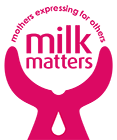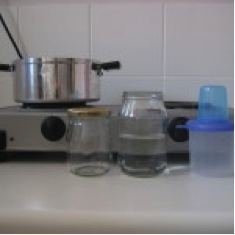Pasteurisation
When would Breastmilk need to be Pasteurised?
Breastmilk donation:
- Human Milk Banks: It is standard practice all over the world for human milk banks to pasteurise donor milk before giving it to recipient babies.
- Milk Sharing: Pasteurising breastmilk being shared informally (rather than through milk banks) is recommended by health authorities to prevent the transmission of infections.
Own Mother’s Milk:
- Mothers who are HIV positive should be given the option of pasteurising their breastmilk for their babies as pasteurisation destroys the HI virus. It is immaterial whether their babies are premature or not.
Pasteurisation can be done safely and effectively at home with minimal costs or equipment.
I decided to donate breastmilk because as a doctor working in the NICU I have seen how our babies benefit from receiving breastmilk only. So often we have seen disastrous consequences when an immature gut has been exposed to formula.
Pasteurisation Methods
The two most commonly used methods of pasteurisation are:
- Holder Pasteurisation (method used by human milk banks)
- Flash Pasteurisation (ideal for home pasteurising)
Flash Pasteurisation
Research conducted by Israel-Ballard K. et al, JAIDS Oct 2005
Equipment
Equipment:
• 1Lt Hart or similar pot
• 450gr Peanut butter or similar glass jar
• Stove / fire (Needs reasonably intense heat)
Method:
• Label glass jar with baby’s name, the date and time
• Mother expresses 50 to 150ml into glass jar
• Cover jar
• Place jar into pot / pan
• Add (room temp) water into pot to 2cm above milk level (about 450ml)
• May need weight on top of jar
• Bring the water to rapid boil – remove milk immediately from both the water and heat source
• Cool milk, administer to baby or store in fridge
Informal Breast Milk Sharing
Milk Matters is committed to supporting breastfeeding and breastmilk feeding for all babies. We encourage and support mothers to provide their own breastmilk for their own babies and will encourage and support all mothers requiring help with any breastfeeding issue. Our priority has been and always will be the support and encouragement of breastfeeding.
We recognize that some mothers will not be able to produce enough milk due to various reasons and their babies will have a need for supplementation. We encourage all mothers to make sure they make educated and well informed choices as to what supplementation is used.
We encourage all mothers to donate to a recognized human milk bank to meet the need of supplementation especially for premature babies. We also recognize that some mothers will donate their excess breastmilk on an informal basis.
We encourage all mothers who choose to supplement with donor milk on an informal basis to ensure that the donating mother has a blood test done, particularly HIV and Hepatitis B, and that the donated milk has been pasteurized.
The donated breastmilk can be heat treated effectively and inexpensively using flash pasteurisation.
Milk Matters accepts no responsibility with regard to a mother’s choice to use breastmilk on an informal basis or to use breastmilk substitutes.
I am so glad to be a part of donating milk to save premmi babies lives… I will carry on with this in the UK! I am proud to be among the first to donate from Hermanus!



